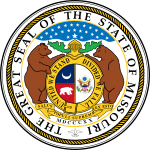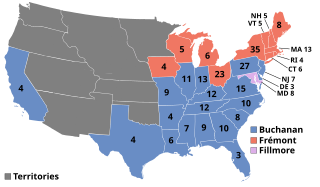
Presidential elections were held in the United States on November 4, 1856. Democratic nominee James Buchanan defeated Republican nominee John C. Frémont and Know Nothing/Whig nominee Millard Fillmore. The main issue was the expansion of slavery as facilitated by the Kansas–Nebraska Act of 1854. Buchanan defeated President Franklin Pierce at the 1856 Democratic National Convention for the nomination. Pierce had become widely unpopular in the North because of his support for the pro-slavery faction in the ongoing civil war in territorial Kansas, and Buchanan, a former Secretary of State, had avoided the divisive debates over the Kansas–Nebraska Act by being in Europe as the Ambassador to the United Kingdom.

Presidential elections were held in the United States on November 4, 1884. Democratic Governor Grover Cleveland of New York narrowly defeated Republican James G. Blaine of Maine. It was set apart by mudslinging and personal allegations that eclipsed substantive issues, such as civil administration change. Cleveland was the first Democrat elected president of the United States since James Buchanan in 1856, the first to hold office since Andrew Johnson left the White House in 1869, and the last to hold office until Woodrow Wilson, who began his first term in 1913. For this reason, 1884 is a significant election in U.S. political history, marking an interruption in the era when Republicans largely controlled the presidency between Reconstruction and the Great Depression.
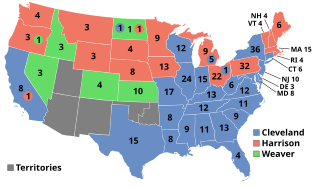
Presidential elections were held in the United States on November 8, 1892. In the fourth rematch in American history, the Democratic nominee, former president Grover Cleveland, defeated the incumbent Republican President Benjamin Harrison. Cleveland's victory made him the first president in American history to be elected to a non-consecutive second term, a feat not repeated until Donald Trump was elected in 2024. This was the first of two occasions when incumbents were defeated in consecutive elections—the second being Gerald Ford's loss in 1976 to Jimmy Carter followed by Carter's loss in 1980 to Ronald Reagan. The 1892 election saw the incumbent White House party defeated in three consecutive elections, which did not occur again until 2024.

Presidential elections were held in the United States on November 8, 1904. Incumbent Republican president Theodore Roosevelt defeated the conservative Democratic nominee, Alton B. Parker. Roosevelt's victory made him the first president who ascended to the presidency upon the death of his predecessor to win a full term in his own right. This was also the second presidential election in which both major party candidates were registered in the same home state; the others have been in 1860, 1920, 1940, 1944, and 2016.

The People's Party, usually known as the Populist Party or simply the Populists, was an agrarian populist political party in the United States in the late 19th century. The Populist Party emerged in the early 1890s as an important force in the Southern and Western United States, but declined rapidly after the 1896 United States presidential election in which most of its natural constituency was absorbed by the Bryan wing of the Democratic Party. A rump faction of the party continued to operate into the first decade of the 20th century, but never matched the popularity of the party in the early 1890s.
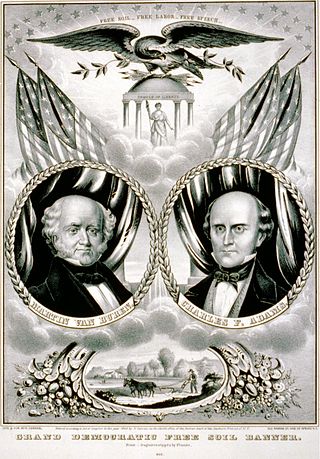
The Free Soil Party was a political party in the United States from 1848 to 1854, when it merged into the Republican Party. The party was focused on opposing the expansion of slavery into the western territories of the United States. The 1848 presidential election took place in the aftermath of the Mexican–American War and debates over the extension of slavery into the Mexican Cession. After the Whig Party and the Democratic Party nominated presidential candidates who were unwilling to rule out the extension of slavery into the Mexican Cession, anti-slavery Democrats and Whigs joined with members of the Liberty Party to form the new Free Soil Party. Running as the Free Soil presidential candidate, former President Martin Van Buren won 10.1 percent of the popular vote, the strongest popular vote performance by a third party up to that point in U.S. history.

The 1908 Republican National Convention was held in Chicago Coliseum, Chicago, Illinois on June 16 to June 19, 1908. It convened to nominate successors to President Theodore Roosevelt and Vice President Charles W. Fairbanks.

The 1928 Republican National Convention was held at Convention Hall in Kansas City, Missouri, from June 12 to June 15, 1928.

The 1856 Republican National Convention was a presidential nominating convention that met from June 17 to June 19, 1856, at Musical Fund Hall at 808 Locust Street in Philadelphia, Pennsylvania. It was the first national nominating convention of the Republican Party, founded two years earlier in 1854. It was held to nominate the party's candidates for president and vice president in the 1856 election. The convention selected John C. Frémont, a former United States Senator from California, for president, and former Senator William L. Dayton of New Jersey for vice president. The convention also appointed members of the newly established Republican National Committee.
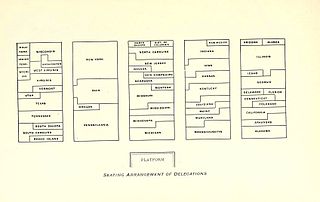
The 1896 Democratic National Convention, held at the Chicago Coliseum from July 7 to July 11, was the scene of William Jennings Bryan's nomination as the Democratic presidential candidate for the 1896 U.S. presidential election.
The 1856 Democratic National Convention was a presidential nominating convention that met from June 2 to June 6 in Cincinnati, Ohio. It was held to nominate the Democratic Party's candidates for president and vice president in the 1856 election. The convention selected former Secretary of State James Buchanan of Pennsylvania for president and former Representative John C. Breckinridge of Kentucky for vice president.

From February 3 to July 13, 1968, voters of the Republican Party chose its nominee for president in the 1968 United States presidential election. Former vice president Richard Nixon was selected as the nominee through a series of primary elections and caucuses culminating in the 1968 Republican National Convention held from August 5 to August 8, 1968, in Miami Beach, Florida.
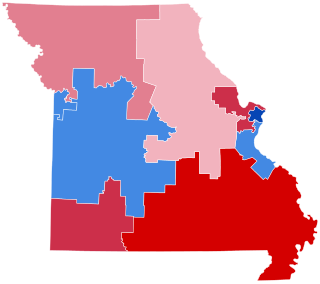
The 2008 congressional elections in Missouri were held on November 4, 2008, to determine who will represent the state of Missouri in the United States House of Representatives. The primary election for candidates seeking the nomination of the Republican Party, the Democratic Party, and the Libertarian Party was held on August 5.

From January 3 to June 5, 2012, voters of the Democratic Party chose its nominee for president in the 2012 United States presidential election. President Barack Obama won the Democratic Party nomination by securing more than the required 2,383 delegates on April 3, 2012, after a series of primary elections and caucuses. He was formally nominated by the 2012 Democratic National Convention on September 5, 2012, in Charlotte, North Carolina.

The 2012 United States Senate election in Missouri was held on November 6, 2012, concurrently with the 2012 presidential election, other elections to the United States Senate in other states, as well as elections to the United States House of Representatives and various state and local elections.
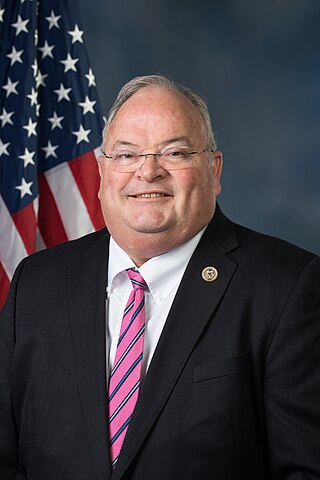
William Hollis Long II is an American politician and auctioneer who served as the U.S. representative for Missouri's 7th congressional district from 2011 to 2023. The district includes much of the southwestern quadrant of the state and is anchored in Springfield. It also includes Joplin and Branson. On December 4, 2024, President-elect Donald Trump announced his intention to nominate Long to serve as Commissioner of the Internal Revenue Service. Long has previously expressed support for simplifying the tax code and exploring tax reform proposals such as a flat tax or a consumption-based system.

The 1976 United States presidential election in Virginia took place on November 2, 1976. All 50 states and the District of Columbia were part of the 1976 United States presidential election. Virginia voters chose twelve electors to the Electoral College, which selected the president and vice president of the United States.

The 2016 United States House of Representatives elections in Missouri were held on November 8, 2016, to elect the eight U.S. representatives from the state of Missouri, one from each of the state's eight congressional districts. The elections coincided with the 2016 U.S. presidential election, as well as other elections to the House of Representatives, elections to the United States Senate and various state and local elections. The primaries were held on August 2.

The 1892 Illinois gubernatorial election was held on November 8, 1892.

The 1888 Illinois gubernatorial election was held on November 6, 1888.
